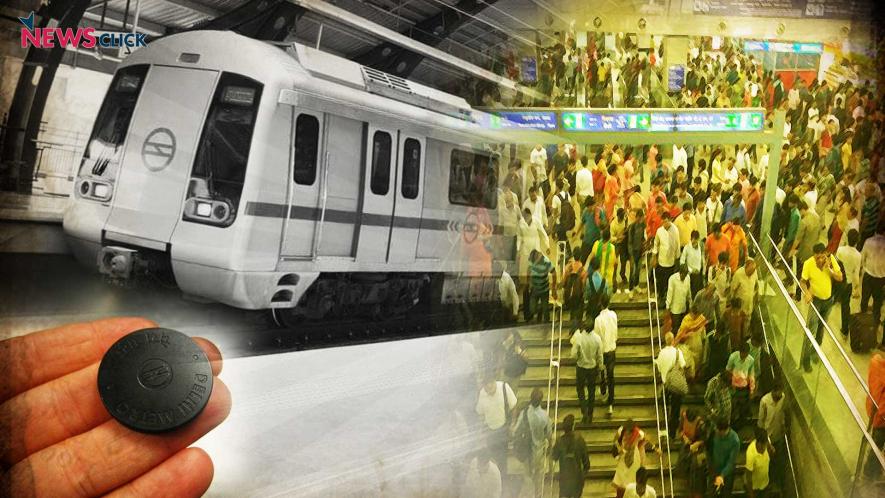Metro Fares Need Not be Increased. Here’s How.

Newsclick Image by Nitesh Kumar
Delhi Metro has been made unaffordable for most commuters, especially the poor, after the recent fare hike. The reason given by DMRC for this is its rising operational costs. Analysis of the balance sheet published by the corporation on its website shows many expenses which can easily be avoided, and the fares maintained at lower costs for the commuters.
The balance sheet shows that traffic earnings have gone up by 7% in 2017 compared to 2016. Other earnings, such as income from land leases and external projects, too have increased significantly in the last year. The total income increase in 2017 was of 25% over 2016.
But what then has been contributing to the losses being faced by the Delhi Metro Rail Corporation?
The balance sheet shows that DMRC has been paying huge amounts as rent to other government bodies. The corporation paid a total of Rs. 42,120 lakhs in land demands from 31st March 2016 to 31st March 2017. Out of this, Rs. 38,608 lakhs was paid to the Indian Railways, and Rs. 3,512 lakhs to other bodies.
The Airport Express line was constructed under a Public Private Partnership (PPP) between DMRC and Reliance Industries Limited. Delhi Airport Metro Express Private Ltd (DAMEPL), the subsidiary of Reliance Infrastructure which brought in the rolling stock and had accepted to run it for 30 years, pulled out in 2013 when it was not able to get returns on its investment. The DMRC is being forced to pay DAMEPL for that failed partnership. DMRC is also running the Airport Express line by itself now, and bearing all its expenses.
Apart from DAMEPL, DMRC has had to pay various costs claimed through litigation by other government bodies as well, including tax bodies. It paid a total of Rs 1,44,793 lakhs in litigation.
Other notable and avoidable expenses include Rs 11,892 lakhs in municipal claims, and Rs. 16,468 in disputed tax demands. The total of all these avoidable expenses comes out to a whopping Rs. 2,15,273 lakhs.
It might be argued that DMRC has to pay various govt. agencies by law. How can this be avoided?
Here, the example of DMRC’s own agreement with Haryana is a case in point. Haryana agreed not to charge anything for advertising revenue, unlike Delhi. Why couldn’t Delhi’s municipal bodies do the same?
More generally, the Central govt. could take up some of the slack and meet these expenses if the law has to be upheld.
So while DMRC’s earnings from traffic, external projects, etc has been increasing, the high amounts it is being made to pay to other government bodies has turned it into a loss making enterprise. The commuters are now being made to pay for these losses.
The government needs to stop extraction of rent money from DMRC so it can continue to serve its purpose of being a mass public transit body. Does it make much sense to make commuters pay more for money for circulation between different government bodies?
Disclaimer: The views expressed here are the author's personal views, and do not necessarily represent the views of Newsclick.
Get the latest reports & analysis with people's perspective on Protests, movements & deep analytical videos, discussions of the current affairs in your Telegram app. Subscribe to NewsClick's Telegram channel & get Real-Time updates on stories, as they get published on our website.
























